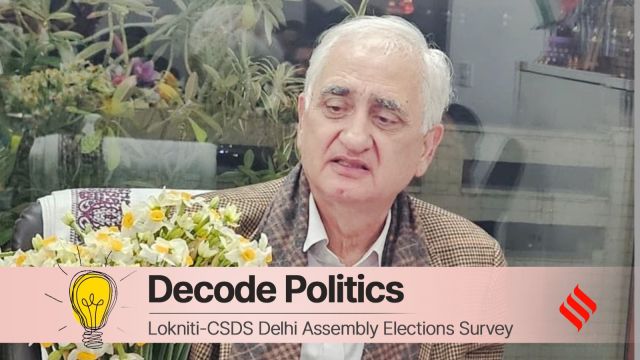Decode Politics: Govt says UPA’s 2013 Waqf amendments were ‘extreme’. Were they?
Among those who welcomed the changes at the time was BJP MP Shahnawaz Hussain, who termed the Bill “quite appropriate” and said it would lead to lesser encroachments of Waqf property.
 Then Minority Affairs Minister Salman Khurshid introduced the amendment Bill in the Lok Sabha, discussions mainly centred around the encroachment of Waqf properties. (X/SalmanKhurshid)
Then Minority Affairs Minister Salman Khurshid introduced the amendment Bill in the Lok Sabha, discussions mainly centred around the encroachment of Waqf properties. (X/SalmanKhurshid)Holding the previous Congress-led UPA government responsible for creating a situation that made introducing the contentious Waqf (Amendment) Bill necessary, Union Home Minister Amit Shah said in the Lok Sabha Wednesday that the amendment by it to the Waqf Act, 1995, was “extreme” and another “appeasement” exercise.
Shah also said that had the law not been tweaked then, the need for the present Bill might not have arisen.
Union Minister for Minority Affairs Kiren Rijiju made the same argument, adding: “In 2013, it was provided that any person, of any religion, could create a Waqf. This diluted the original Act (1995). Then, it was provided that there could be only Shias in the Shia Waqf Board and only Sunnis in the Sunni Waqf Board.”
So what was the 2013 amendment, how does the new legislation change it, and the debate around it in Parliament:
What was the 2013 amendment?
The Bill was first introduced and passed in the Lok Sabha on May 7, 2010. However, the Rajya Sabha sent the Bill to a Select Committee for scrutiny and it suggested certain amendments. The Lok Sabha debated the amendments in 2013 and subsequently passed it.
The Waqf (Amendment) Act, 2013, introduced several key changes to the Waqf Act (1995). It strengthened the functioning of the tribunals meant to hear disputes regarding Waqf properties under the 1995 Act, and created a Central Waqf Council to oversee the functioning of state Waqf boards. The Council was to study their financial performance, surveys, encroachments on properties in their jurisdiction, and several other factors.
What were the discussions in Parliament in 2013?
After then Minority Affairs Minister Salman Khurshid introduced the amendment Bill in the Lok Sabha, discussions mainly centred around the encroachment of Waqf properties.
Hailing the Bill, the Congress’s Asraul Haque said “several good amendments” had been introduced to the 1995 Act. “Section 52 provides for a two-year jail sentence for illegally occupying or purchasing Waqf properties. Similarly, the right of the Waqf board to sell and gift the Waqf’s property has been done away with. Likewise, the period prescribed for survey of Waqf property has been reduced from 20 years to 10 years,” he said.
Former Bihar chief minister and RJD supremo Lalu Prasad had also welcomed the Bill, with a rider. The RJD counts on Muslims as a major vote bank in Bihar. “We are clearing the amendment Bill as of now, but I would like that the government may introduce a more strict law in this regard in the future and provide it with Constitutional powers. The sale and purchase of Waqf property be declared as cognizable offence,” he said.
Lakshadweep MP Hamdullah Sayeed backed the call for more stringent laws and their effective implementation. He said income generated from Waqf properties “should reach the intended beneficiaries”.
Incidentally, BJP MP Shahnawaz Hussain also termed the Bill “quite appropriate” at the time, saying that “most of the land under Waqf” was “under litigation”. The amendments, he argued, would lead to lesser encroachments of Waqf property. “You cannot change its (Waqf) land use because it is for the welfare of the poor and orphaned… I would like to make a request that the government should remove the unauthorised occupations of land done by the minority community themselves,” he added.
Hussain went on to cite examples of the Delhi Development Authority (DDA) and the Municipal Corporation of Delhi (MCD) — which have the power to reclaim encroached lands — to elucidate his point about Waqf boards needing more power.
After the discussion, Khurshid said the purpose of the Bill was to allow women to join state and central Waqf boards. “From the Waqf fund, we must be able to help the orphans and women who do not have anyone to look after them. This is the objective behind this and we hope that we will be able to achieve this objective,” he said.
Admitting that many cases involving Waqf boards and the government were ongoing at many places, the minister said the government was involved only because it was the custodian of Revenue Department records. “There are differences at many places in the revenue records and survey records of the Waqf. Which is why we have strengthened the tribunals further and have decided (on) forming a three-person tribunal… The High Court is there after the tribunal and one can approach the High Court also,” he said.
What changes does the new Bill present to the 2013 amendment?
Though large swathes of the 2013 amendment have been retained, some key aspects have been fundamentally changed.
The 2013 Act had introduced Section 108A to give the Waqf Act “overriding effect” if there were any inconsistencies with any other law in force, effectively prioritising the provisions of the Waqf Act over other laws in any case that arises. This Section has been deleted entirely in the current Bill.
The new Bill also changes the requirements for designating property as belonging to Waqf. It now recognises new kinds of Waqf properties depending on the specific community that is dedicating property, while simultaneously restricting who can dedicate Waqf property.
While the 2013 amendment only recognised Shia and Sunni Waqfs, the current Bill introduces Agakhani and Bohra Waqfs. The new Bill also allows only individuals who can show or demonstrate that they have been “practising Islam for at least five years” before dedicating a property as Waqf.
Crucially, while the 2013 amendment strengthened the functioning of tribunals, the new Bill dilutes their significance in the overall administration of Waqf properties. While the 2013 amendment said the “decision of the tribunal in respect of such matter shall be final”, there is no such sentence in the new Bill.
In areas where there is no tribunal or where there are not are not enough members for it to function, the new Bill allows stakeholders to directly approach the High Court instead.
The new Bill also significantly changes the composition and functioning of the Central Waqf Board and state Waqf boards. It allows non-Muslims to be a part of the boards for the first time. It also completely deletes the 2013 provision that detailed the process for removing a chairperson.
Under the new Bill, there is no requirement for the Chief Executive Officer of a Waqf board to be a Muslim, although the appointment process introduced in 2013 has been retained.





- 01
- 02
- 03
- 04
- 05


























